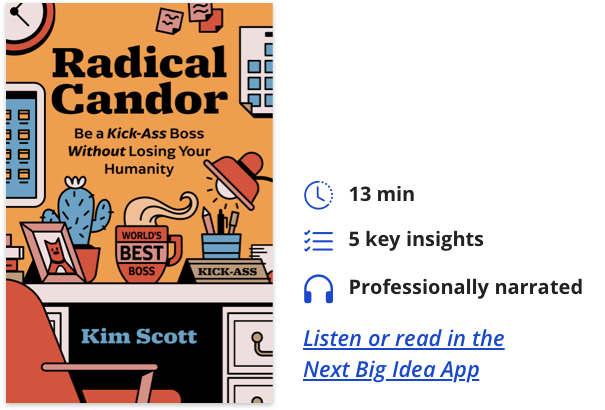First published in 2017 and updated in 2019, Kim Scott’s bestseller Radical Candor: Be a Kick-Ass Boss Without Losing Your Humanity aims to define and explain the management style heralded in its title. Scott built her leadership philosophy throughout her time as a former manager at Google and Apple, management coach, and co-founder of her own companies. And in her book, she explains it in detail for the reader, alongside practical advice for how to implement her ideas.
In our series of “Book Bite Classics,” we share five key insights from groundbreaking, beloved books that everyone should read. Below you’ll find one big idea from Radical Candor—to read or listen to the remaining four, download the Next Big Idea App today.

Big Idea: Give radically candid guidance.
The first goal of any good boss is to be able to be able to give—and receive—effective guidance. Scott defines ideal guidance as one where we care personally and challenge directly.
Caring personally can be a bit difficult for some readers to wrap their heads around. Conventional wisdom holds that we must remain “professional” in the workplace, separating work from personal life. However, Scott disagrees. She argues for work-life integration, insisting that one cannot exist without the other. Therefore, showing your employees that you care about their personal health deeply affects their work health, and is paramount to building the trusting relationships necessary for Radical Candor.
When it comes to giving Radically Candid guidance, Scott urges bosses to “praise in public, criticize in private, and don’t personalize.” That last bit is essential, as personal attacks (or even perceived personal attacks) are a surefire way to dissolve trust. To combat this, Scott advises being specific, actionable, and always offering to help. Focusing on the situation, behavior, and impact allows the employee to better understand why they’re being criticized and how to make necessary changes. The same applies to praise. It must be specific and genuine.
Perhaps most importantly, Radical Candor is a two-way street. Bosses must be open to receiving guidance, too, and they should encourage challenges from their team members. This can be tricky because employees are often unsure about giving criticism to the boss and risking punishment, or of giving praise and looking like a kiss-up. In response, Scott argues that it’s important for bosses to first explain Radical Candor to their teams, and then model Radically Candid behaviors to make them comfortable. Once employees start challenging, bosses must practice listening and understanding, not defending themselves. If modeled well and encouraged by the boss, Radical Candor can spread throughout all team interactions whether they be vertical, such as boss-to-employee, or horizontal, peer-to-peer.
To read or listen to the rest of this Book Bite, download the Next Big Idea App today:






























